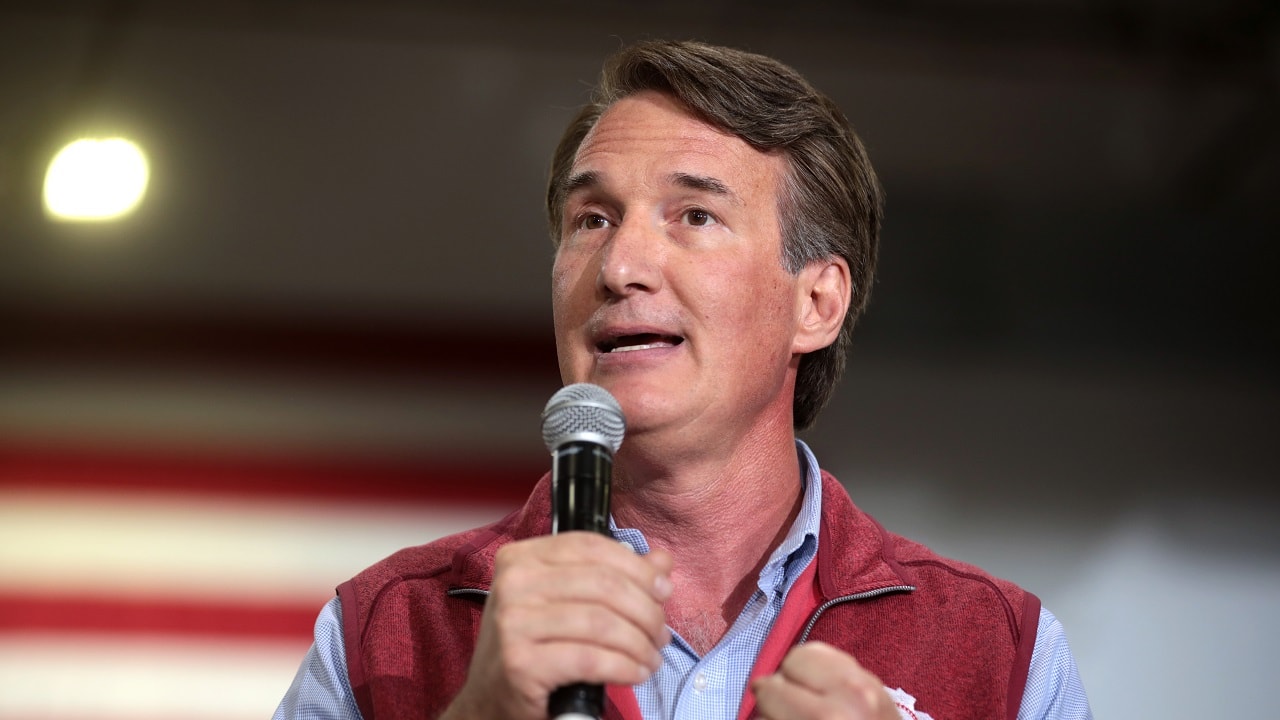Add Republican Governor Glenn Youngkin to the list of leaders crossing state lines to drum up support for conservative principles and inspire hope to those who may feel a little hopeless these days – namely conservative Californians.
Youngkin appeared at the Ronald Reagan Library Monday night in Simi Valley, California to offer words of encouragement to over a hundred parched guests seeking hydration from living in a desert dominated by progressive agendas. Listeners seemed to be revived by the reminder of philosophies that likely drew them to the event in the first place, as well as his liberal invocation of God; a word rarely uttered in California social circles or political discourse.
The governor from Virginia reiterated many of the foundational principles conservatives, and fans of the Reagan legacy, hold dear: free enterprise, peace through strength, fiscal discipline, and the rights of parents in education.
Victory in Virginia
While Youngkin ran on a platform of these traditional ideals, it was the last that really cinched his victory back in 2021, not an easy feat.
For the past two decades, Virginia predominantly has voted blue. The metropolitan areas of the D.C. suburbs, Norfolk, and Richmond, as well as Charlottesville, an area dictated by University of Virginia intellectual elites, have overshadowed the many, but significantly smaller rural towns that vote red. Until Youngkin, Republicans had not won a statewide seat in Virginia since John Warner in 2009. The state voted for Joe Biden in the past two elections and Democrat Mark Warner in the Senate. To say Youngkin pulled off an upset in 2021 against his Democratic opponent Terry McAuliffe, a predictable back-slapping establishment politician quite cozy within D.C. circles, is an understatement.
McAuliffe sealed the current governor’s victory with one fateful sentence: “I don’t think parents should be telling schools what they should teach.”
The push to remove parents from their children’s educational experience seems to be driving many away from progressive policies. During his campaign, Youngkin capitalized on those shared concerns, and what he often referred to as shared values in his speech, that seemed to unite parents of both sides.
Shared American Values
Youngkin was optimistic that these kind of American values – values that prioritize family, hard work, meritocracy, and an entrepreneurial spirit – and the policies and decisions informed by them, will prevail. “If you’re resting, someone else is working,” Youngkin told listeners.
Youngkin emphasized his points with poignant and funny tales; growing up washing dishes only to become a self-made millionaire, his young son writing an essay on leadership, choosing to highlight Ronald Reagan over his father. A story of a veteran and his wife who opened up a barbershop in Virginia, that while offering haircuts, also wanted to promote traditional values. These tales of middle America underscore many Republicans’ belief that “people don’t need a handout, but freedom to pursue their dreams with the government out of their way.”
While Youngkin focused on the triumphs of Virginia, his message reflected a larger struggle for what conservatives – like Tucker Carlson in his speech at Heritage Foundation’s 50th Anniversary – often present as the battle for the soul of America. He often referred to Virginia, with its transformation over the past two years under Republican leadership, as a “light.”
Youngkin stressed that he has been able to accomplish lower taxes, higher teacher salaries, and better educational and business opportunities amidst a purple state legislature. He also stated that Virginia transformed from a state experiencing high outward migration to a place where more people are calling home, although I could not find evidence to support that claim.
Common Sense Politics
Youngkin credited his accomplishments to a simple “common sense” approach, a highlight of his speech. Something that, contrary to its first-word reference, does not seem to be so common in today’s culture.
Many contest that this is now a unique trait of the Republican party, or at the very least, more social conservatives. The phrase has often been deployed in debates around radical gender and education policies. Rightly so. Claiming a boy can become a girl or vice versa and replacing widely accepted language with what is considered more inclusive terminology (“breastfeeding” vs. “chestfeeding” or “guardian” vs. “mom” or “dad”) seems to qualify as the kind of insanity Youngkin and leaders like him attempt to defy.
The governor also joins Ron DeSantis in pursuing distinct foreign policy efforts on behalf of his state. Youngkin recently signed an executive order establishing a Virginia trade office in Taiwan to build a “trusted supply chain.” Following in Kristy Noem’s footsteps in South Dakota, he has banned Tik-Tok and WeChat from government-issued devices.
A Note of Hope
Some have speculated Youngkin’s success in Virginia positions him as a strong Republican primary contender. While a presidential bid may be a possibility in the future, Youngkin seems content to make a name for himself in Virginia politics, simultaneously spreading a message of hope beyond state borders for conservatives who feel like their values are frequently misrepresented and trampled on. When it comes to resisting progressive behemoths such as California, we’ll take all the inspiration we can get.
More: Could Mike Pence Beat Donald Trump in 2024?
More: NATO vs. Russia – What World War III Would Look Like
Jennifer Galardi is the politics and culture editor for 19Fortyfive. She has a Master’s in Public Policy from Pepperdine University and produces and hosts the podcast Connection with conversations that address health, culture, politics, and policy. In a previous life, she wrote for publications in the health, fitness, and nutrition space. In addition, her pieces have been published in the Epoch Times and Pepperdine Policy Review. You can follow her on Instagram and Twitter.
Note: This piece has been updated since publication.

